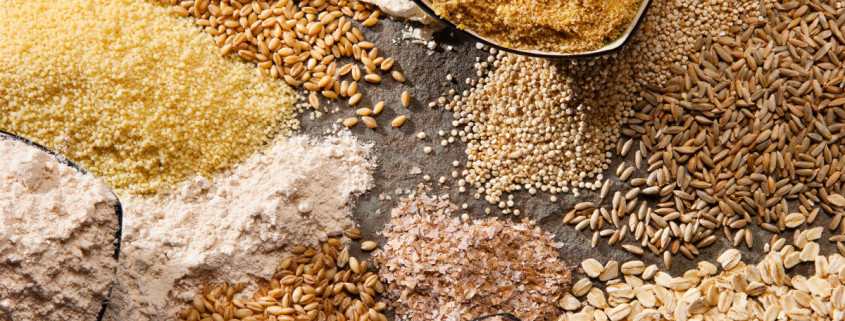Flimflam Food: The Truth About Grain-Free Pet Food
Grain-free pet food is one of the fastest growing areas of the pet food industry. Even major commercial brands such as Purina and Science Diet now have grain-free pet food options for cats and dogs. Due to clever marketing, “grain-free” has become synonymous with premium quality and the assumption is that it is a more biologically-appropriate food for both cats and dogs.
However, it’s important to note that “grain-free pet food” does not mean “zero” carb, or even “low” carb, which is a very important distinction. Carbohydrates are an essential part of the manufacturing process of dry pet food, or kibble. Just like with baking; you have to have a flour source or binder to create kibble; whether it’s wheat, corn, potatoes, peas, etc. It is the nature of kibble and can’t be avoided.
“Grain-free” kibble only means that the carbohydrate binder of choice is something other than grain, such as potatoes, lentils, or peas. Grain-free foods can be equally high in carbohydrates when compared to their grain-based counterparts. For cats, potatoes and peas are just as inappropriate as corn, wheat, or soy.
A cat’s natural diet of rodents, rabbits, insects and birds, is about 2% carbohydrate. Dry cat food is generally 25-35% carbohydrate. Carbohydrates in such excessive percentages contributes to both obesity and diabetes, and therefore no kibble is a biologically appropriate food option for cats.
As a frame of reference, let’s take a look at how many carbs are in some of our most popular foods as well as other foods on the market:
Percentage of Carbohydrates | Sample of Brands
Cat Dry Food (Kibble)
- Orijen dry food: 17%
- Earthborn dry food: 18.5%
- Acana Dry food: 27%
- Taste of the Wild: 27%- 39%
- Blue Buffalo Wilderness: 25-27%
- Science Diet w/d: 30%
- Science Diet t/d: 34.4%
- Hill’s Ideal Balance: 35.3%
Dog Dry Food (Kibble)
- Orijen: 29%
- Earthborn: 29.5%
- Petkind: 29.5%
- Fromm Grain-free: 35%
- Blue Buffalo Wilderness: 30-35%
- Taste of the Wild: 37%-46%
- Kirkland: 45%
- Science Diet w/d: 40.2%
- Science Diet t/d: 51.7%
Carbohydrates are not typically listed on pet food labels, but there is a simple calculation to figure out how many carbs are in your animal’s food. Simply add all of the percentages listed, including protein, fat, fiber, moisture and ash, and subtract the total from 100. Here are a few examples:
EXAMPLE 1: Earthborn Cat Primitive
- Crude protein – min 44%
- Crude fat – min 20%
- Crude fiber – min 3%
- Moisture – max 10%
- Ash – max 4.5%
TOTAL: 81.5%
100% – 81.5% = 18.5% CARBS!!!!
If you are trying to figure out how many carbs are in canned or raw food you must first convert the percentages into dry matter.
EXAMPLE 2: Earthborn Cat can Chicken Catcciatori
- Crude protein – min 10%
- Crude fat – min 2%
- Crude fiber – min 1.5%
- Ash – max 3%
- Moisture – max 82%
Total: 98.5%
Dry matter conversion: Subtract the moisture percentage from 100 percent: 100%-82% moisture = 18% dry matter
100% – 98.5% = 1.5% / 18% = 8.3% carbs
EXAMPLE 3: Small Batch Raw Cat food:
- Crude Protein (min): 15.9%
- Crude Fat (min): 8.9%
- Crude Fiber (max): 0.3%
- Ash (max): 2.9%
- Moisture (max): 71.8%
Total: 99.8%
Dry matter conversion: Subtract the moisture percentage from 100 percent: 100%-71.8% moisture = 28.2% dry matter
100% – 99.8% = 0.2% / 28.2% = 0.71% carbs
In summary, we feel that for a majority of dogs and all cats, protein should be the main source of dietary nutrition and calories. Incorporating less processed and lower carb food options is always encouraged, and there are a wide variety of ways to accomplish this. Feeding canned, raw, freeze-dried, and air-dried meat options are easy to incorporate, highly digestible, and very palatable – even for the pickiest of eaters.
Stop by the store to talk with us about your animal’s diet and history and we’ll help you develop a customized feeding plan to meet your needs.

